Directory link-building is one of the oldest SEO and most popular strategies. As we're heading into 2026, you may wonder: is it still effective?
In this article, we'll dive into this question, exploring the pros and cons of directory links and how you can use them to enhance your SEO results.
First, let’s cover a few basics to set the stage.
What is Directory Link Building?
Directory link building involves listing a business in online directories.
Here's an example of a listing in Yell, formerly Yellow Pages, a well-known directory.
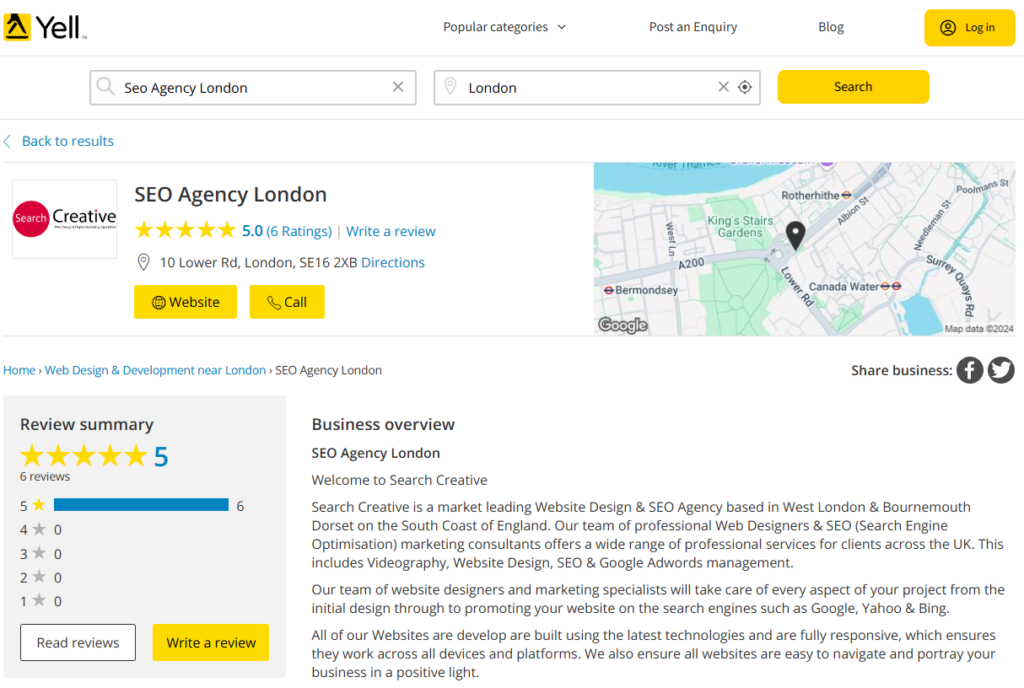
As you can see, the business profile contains a button with the agency's website URL.

Benefits of Directory Link Building
What are the benefits of directory backlinks? I asked 9 SEOs and marketers for their insights.
SEO performance
Web directory link building is a popular strategy because getting dozens or even hundreds of backlinks requires relatively little effort.
Unfortunately, its popularity has led to a proliferation of low-quality directories created for the sole purpose of providing backlinks.
Enough is enough, said Google, and released its Penguin update. It was designed to address the issue of spammy links. In practice, they stopped considering spam links for ranking purposes and started dishing out penalties to the worst offenders.
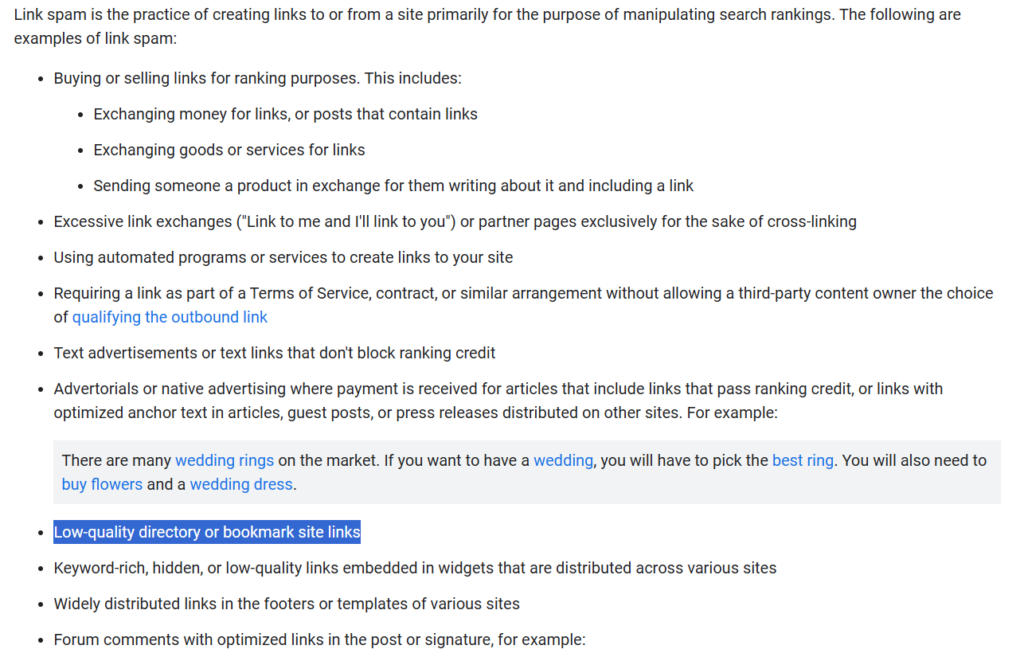
This means that directory backlinks don't weigh as much as they used to.
But is the tactic a total waste of time?
For starters, it allows you to diversify your backlink profile. You would expect every solid marketing strategy to include directory listings, so having a few such backlinks makes your link profile more natural.
When it comes to the overall impact on SERP performance, SEO experts are divided.
Kristie Plantinga, Founder at TherapieSEO, has no doubts that they affect search engine rankings positively, but it depends on the quality of the directory:
Directory links can definitely boost SEO performance – but only if the directory is reputable. Search engines value links from trusted sources, so a directory with strong authority can help boost your site’s trust and ranking.
Marin Cristian Ovidiu, the CEO of Online Games, is a bit more cautious. He believes that the impact of directory backlinks on SEO performance is limited, especially in the long run.
The best thing about directory links is they can quickly raise a website’s visibility and authority, but this is often just a quick boost. In my experience, while directory links can help SEO a bit—they don’t actually bring long-term results.
For Dan Richardson, a freelance SEO consultant, the tactic could be useful for new websites.
They help the site get found and indexed, when a site is new with next to no links pointing to it, it’s difficult for bots to find the site. Having links from good quality directories helps those new pages get crawled and indexed.
J. Ivy Boyter, the founder of Full Throttle SEO, also believes that such links are valuable for new businesses as they help them establish themselves as legitimate entities in the eyes of the search engines:
Especially for new businesses, link building in directories can reinforce to search engines the legitimacy of a business.
Ken Marshall of RevenueZen echoes Ivy's views:
I think when a business or website is new, directory links absolutely improve SEO performance… Those mentions, follow or not, are positive signals to search engines and prospects that the business is legitimate.
Local visibility
The SEOs I talked to agree that directories can help your local SEO efforts or "put a business on the map" as Paul DeMott, the CTO at Helium SEO, phrased it:
One of the main benefits of directory link-building is establishing local authority. Local directories, in particular, can put a business on the map—literally by connecting it to an audience in a specific area. This is especially useful for businesses with a local customer base because it helps build trust among potential clients nearby and signals to search engines that the business has strong local relevance.
Referral traffic and lead generation
In his comment, Paul touches upon the main benefit of directory listings: higher online visibility, which translates into more leads.
For Aaron Whittaker, the VP of Demand Generation at Thrive, this is way more important than the links:
The biggest benefit of directory link-building isn’t actually the links –- it’s the local visibility boost that directly impacts lead generation.
Oliver Applebaum, the SEO Manager at Compare Club, agrees:
High-quality directories can attract relevant audiences actively looking for businesses like yours, providing exposure beyond just SEO.
While skeptical about the impact on rankings, Ivy Boyter does believe that high-quality directories can drive valuable referral traffic to your site:
I don’t believe they provide a massive uplift, however, I’ve seen the benefits of referring traffic from directories like Clutch.co or Manta.
Moreover, many directories allow you to collect social proof in the form of customer reviews, which can help you convert new leads into customers.
They don’t necessarily help you rank higher, but instead, they help increase conversions. If a customer Google’s “ABC Plumbing” and sees five directory sites with 5-star ratings, it increases the chance of a conversion by a mile. This is crucial for local SEO specifically.
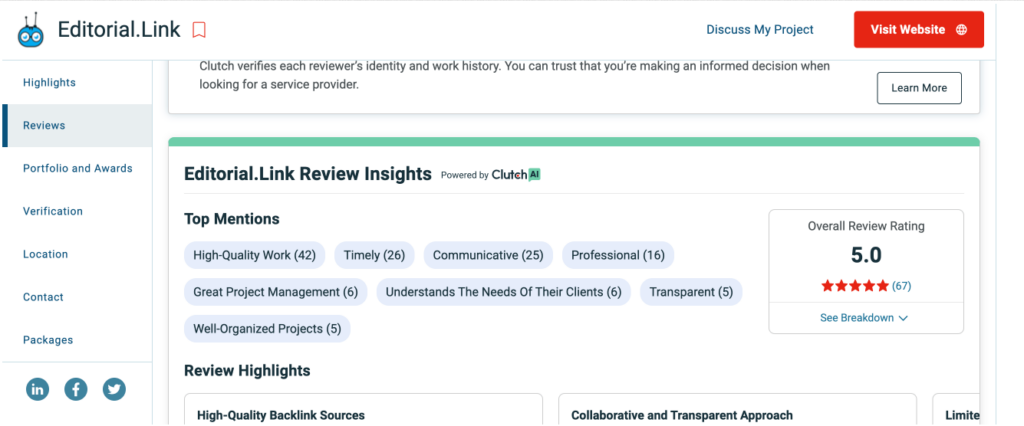
Types of Backlink Directories
There are 4 main types of directories where you can list your business.
General directories
The Yell listing above is an example of a general directory listing. General web directories cover a wide range of websites across all industries without focusing on any particular niche. They aim to provide a comprehensive list of businesses, making it easy for users to find general services.
The main downside of such directories is that they often do minimal vetting. In fact, many of them use bots to manage the listings, so the quality of the listings may vary.
Business directories
Such directories list only registered businesses offering tangible products or services. Their purpose is to connect customers and clients with genuine businesses they can trust. To ensure this, they have strict vetting processes.
For example, the Better Business Bureau offers an accreditation scheme that ensures customers deal with verified and ethical businesses.
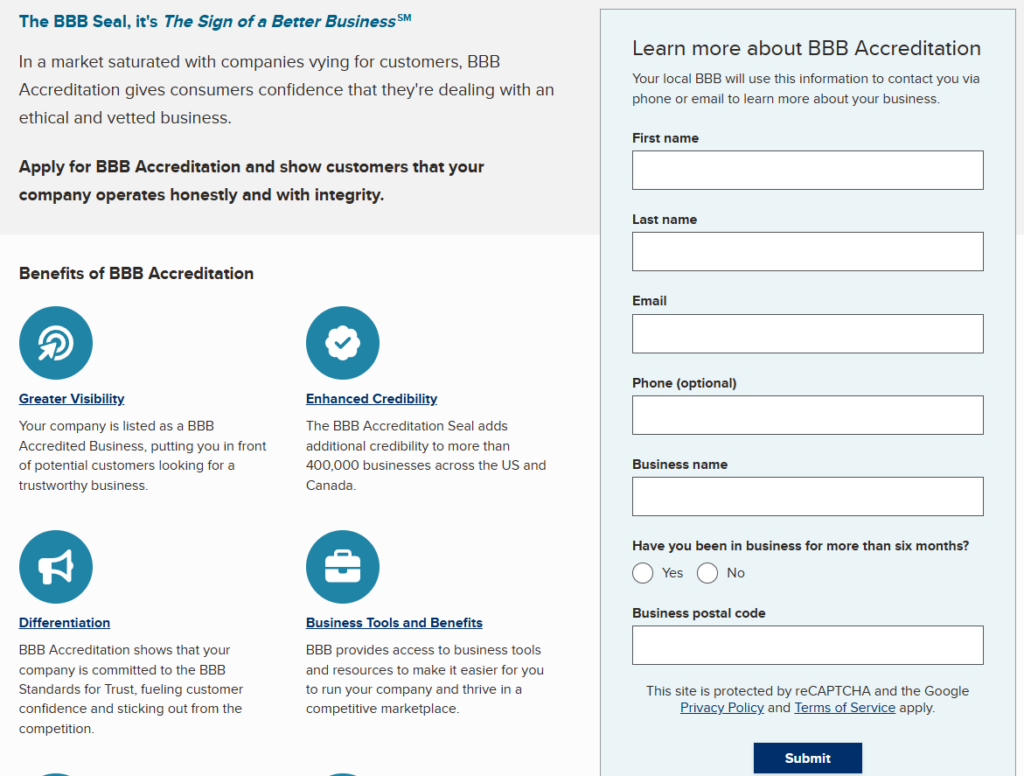
Business directories are ideal if you're looking to build credibility and attract direct, high-intent customers. They will work for you if you're in a competitive or highly regulated industry like finance, healthcare, or home services.
Niche directories
Niche directories focus on specific industries, fields, or topics.
For example, BloggingPro runs a directory for freelance writers.
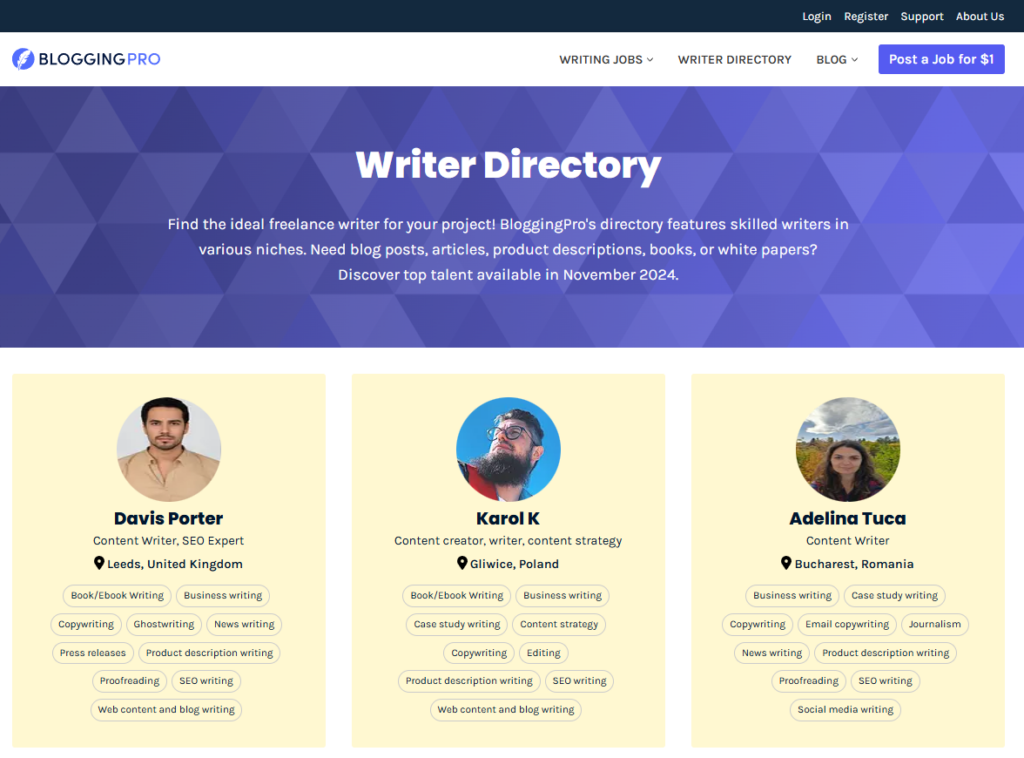
Niche directories are valuable for two main reasons:
First, as discussed above, they attract users actively searching for specific services, meaning your business reaches an audience more likely to engage or convert.
Because they align closely with your industry, they also provide stronger contextual relevance for SEO. In other words, search engine bots can better understand what your company does if you're listed among similar businesses:
Links from credible, industry-specific directories are valuable because they add context. Search engines assess these links to understand your business’s relevance in a particular niche or geography.
Paid directories
Paid directories charge a fee to list your business, often in exchange for increased visibility, better placement, or additional features.
For instance, the UK-based directory for builders and home-improvement professionals, Checkatrade, charges tradesmen membership fees starting from £30 a month.
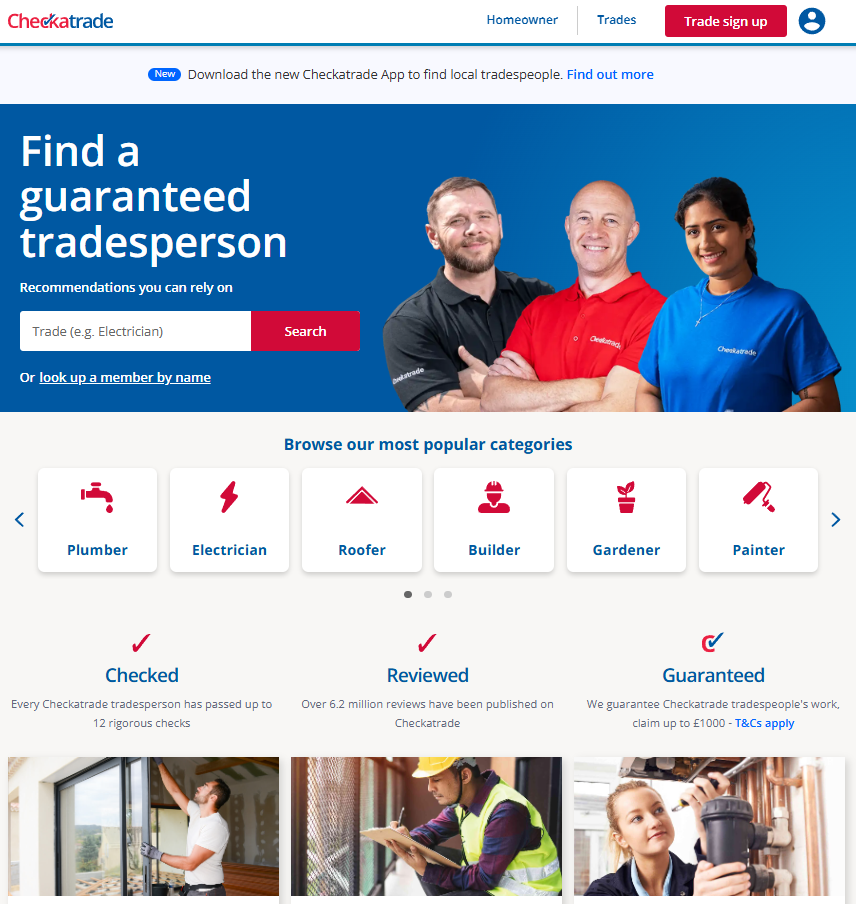
The key benefit of paid directories, according to Isaac Bullen, the Director of Marketing at 3WH, is their strict vetting processes so that every directory submission is of the right quality.
Paid directories often add value too, as the review process usually weeds out low-quality listings, helping to keep the directory clean and trusted.
Higher membership levels also come with benefits like enhanced profiles or prominent placement, which further increase your visibility.
How to Choose a Quality Web Directory
Let me talk you through the factors you should consider when choosing a directory submission site.
Directory relevance
Did you know?
84,6% of SEOs and link builders who took part in our study find relevance the key factor when evaluating links.
Directory link-building is no different.
The key is hyper-relevance – we completely skip general directories and focus only on authoritative industry-specific ones.
Imagine that you are a link-building business, like us. It's logical that you would want to be listed in a directory with a dedicated category for such services, like DesignRush.
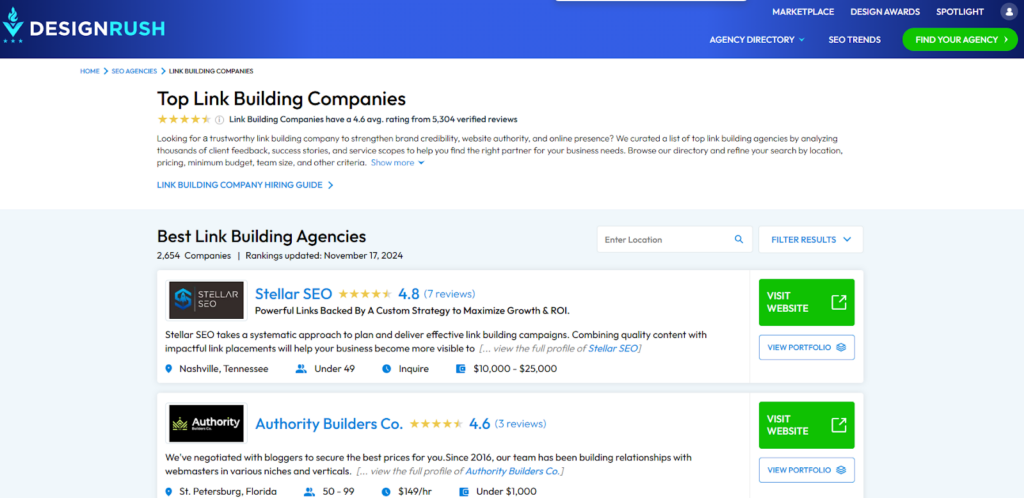
Traffic
As we've already established, referral traffic is one of the main reasons for submitting your website to directories. So, checking if the directory gets enough visitors is a no-brainer.
Choose directories that have high organic traffic and user engagement because this guarantees that the directory can help send traffic to your site and promote your business.
You can do it quickly using tools like the free Ahrefs Website Traffic Checker.
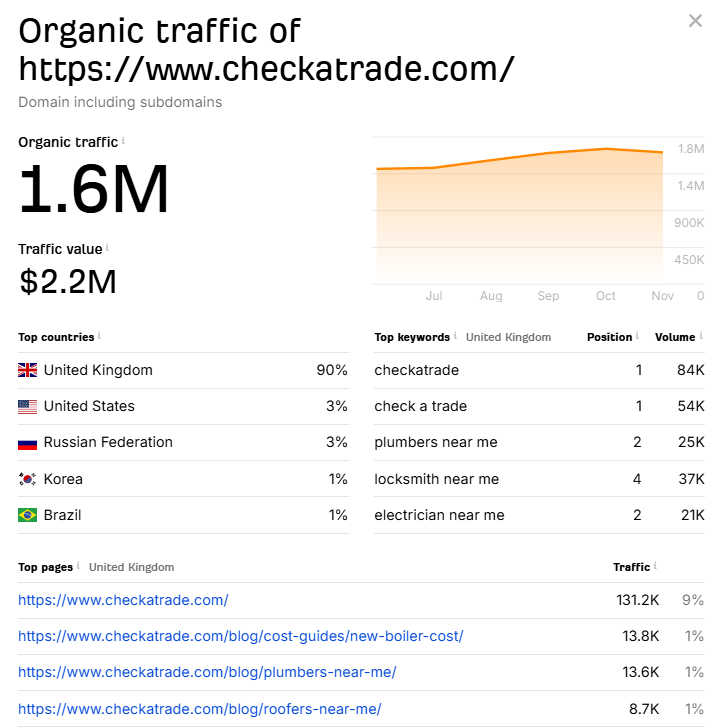
Doing so website by website can be tedious. However, if you have an Ahrefs subscription, you can check the traffic for multiple sites using its Batch Analysis tool.
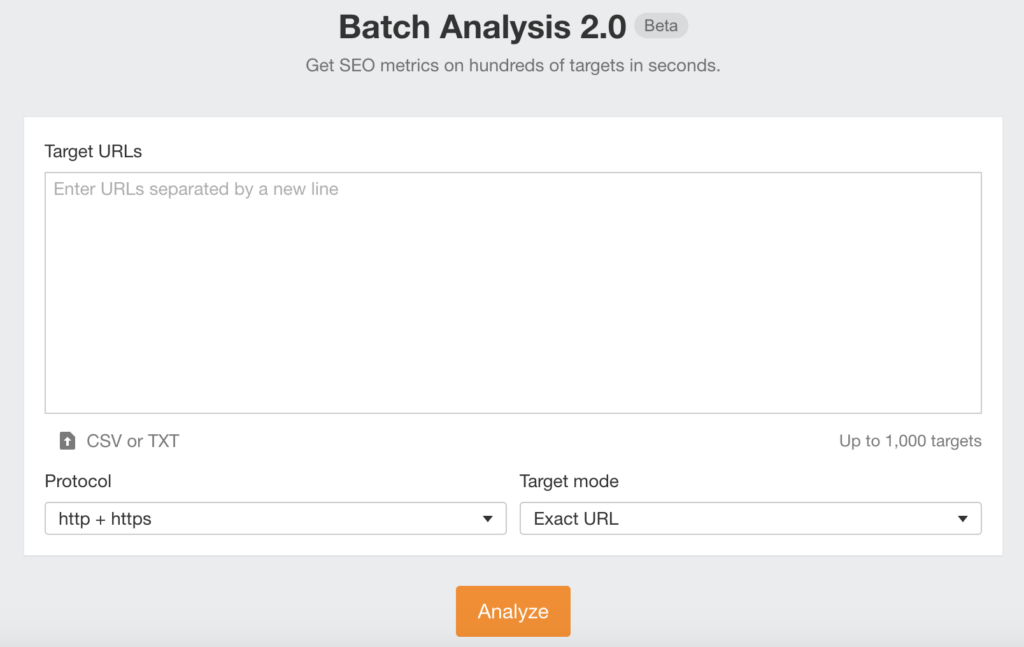
Domain authority
Domain Authority or similar metrics aren't as important for directory link-building as for other tactics. The fact that the directory has a high DA/DR doesn't mean it will pass more link juice to your site. That's partly because these links are usually nofollow.
However, by checking the metric, you can make sure you're dealing with a high-quality directory.
Again, Ahrefs offers a free authority checker if you don't have a paid plan.

With DR90 and backlinks from 24k unique domains, Checkatrade is a safe bet.
Website indexation
If search engines don't index the website, it won't pass any SEO benefits. What's worse, the visitors won't be able to find it, so it won't increase your brand exposure or drive any referral traffic.
The easiest way to check if a website is indexed is by using the "site:" search operator, for example, site:directory.dailyecho.co.uk/. If it appears in the search results, it means it's kosher.
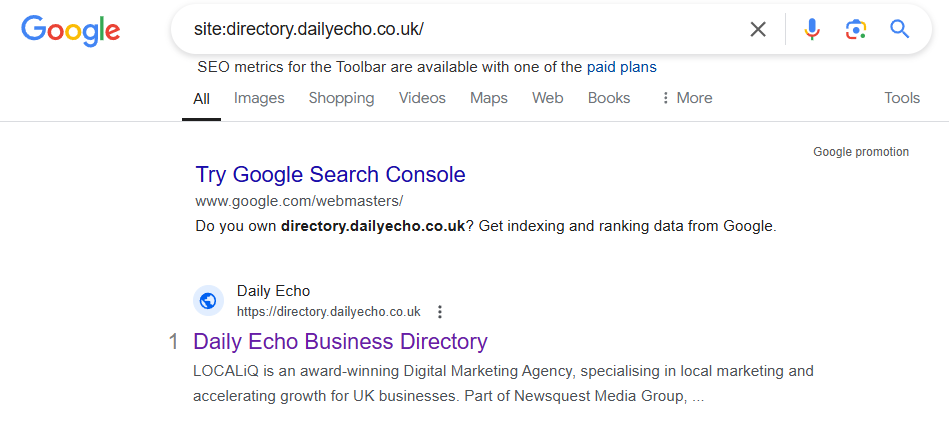
Alternatively, you could use a dedicated tool like BacklinkManager's Backlink Evaluator.
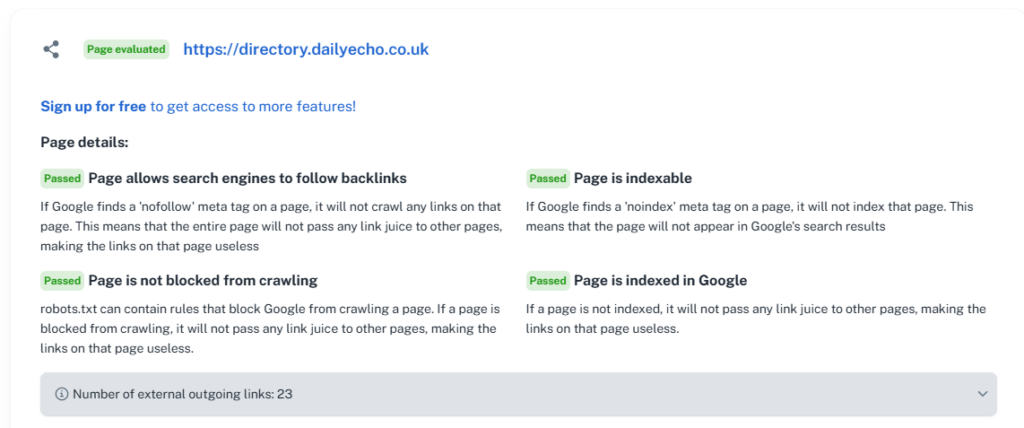
Website and listing quality
The quality of the website and the business listings is another thing to look at. A spam site filled with random listings won’t provide value and could harm your site’s SEO.
How can you decide if you're dealing with a spammy directory?
Watch out for directories with:
- Lots of ads
- Thousands of outbound links in hundreds of categories
- No/minimal guidelines
- Mentions of “link submissions”
Pushing for paid submissions is also a red flag.
Here's an example of such a directory. It lists nearly 45k websites in 276 categories, so it's hard to imagine that they are vetted thoroughly.
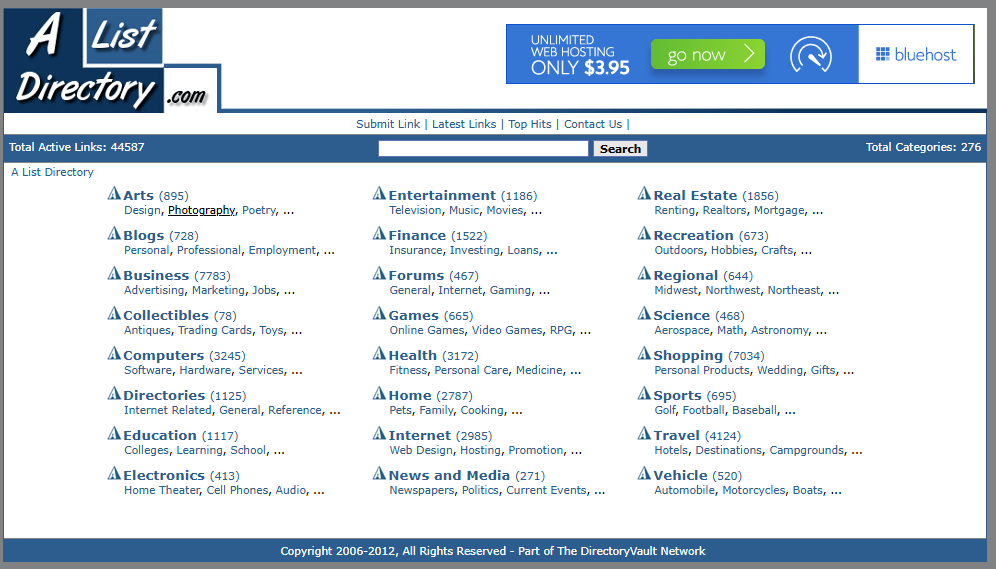
The directory does have submission policies, but you can easily see that it was built for link-building purposes. It’s not a business directory but a link directory.
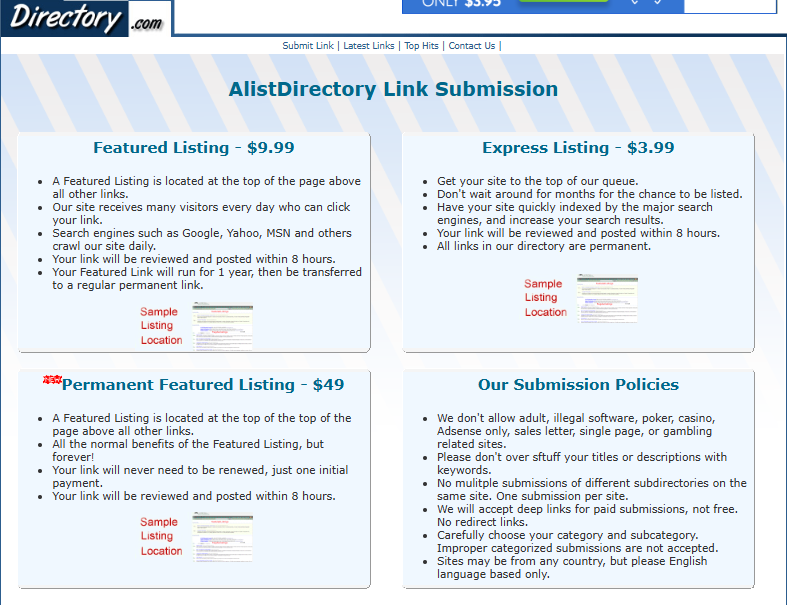
Website design
The website doesn't need to be spammy to cause harm. Many directories look dated. As if built in the 90s.
You don't want to be associated with such websites because they can reflect poorly on your brand.
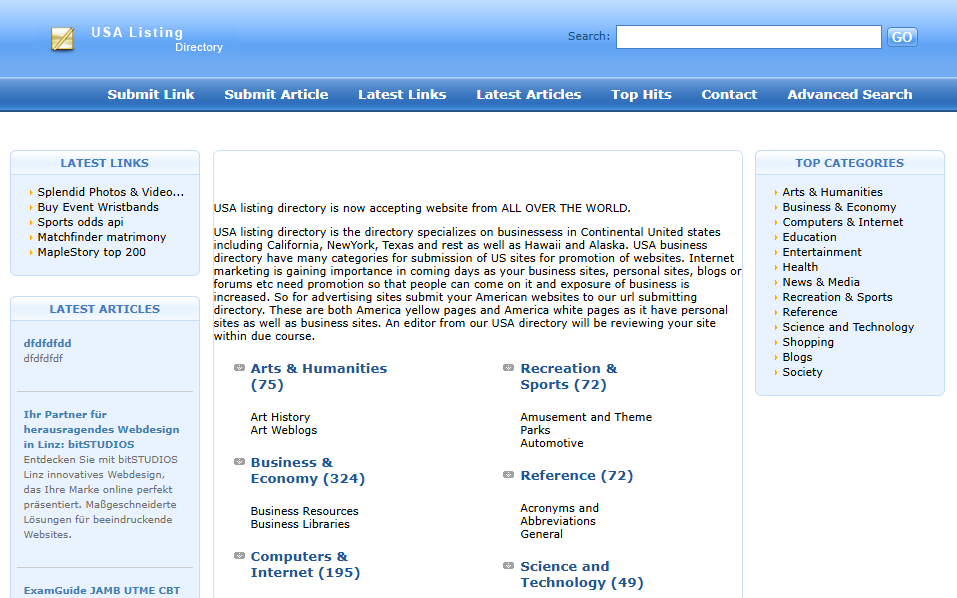
How to Build Great Directory Backlinks — Best Practices
Let's finish with a few tips on how to leverage directories to get quality backlinks:
1) Constantly look for new opportunities
You can easily find directories your competitors use. Sure, they're a good start, but they won't give you the edge. To achieve this, you need links from unique sites.
Keep in mind that search engines also value links that are unique. Since many professionals like you will have links from the same directory, that link isn’t particularly unique to you.
2) Optimize for search
Adding keywords in your listing titles and body increases their discoverability.
3) Write a unique description
A well-written description, enhanced with high-quality photos or graphics, will make your product stand out.
4) Keep your listings up to date
As your product or service evolves, so should your listings. For example, if you add new features to your software, add new screenshots. When you move office, update the contact details. You get the drift.
An ideal practice for efficient directory link-building is performing updates on the lists regularly. This gives customers and search engines information that is up to date about your business, which is important in building trust and maintaining interest with your target audience.
5) Take advantage of premium features
Some directories are much more than just lists of businesses. For example, they allow you to publish articles or case studies. Olexandra Dubakova, the CMO at Free Tour, encourages you to take advantage of such opportunities as these can further increase your online presence:
Create a co-branded content piece while submitting your link to your preferred niche directory. Some directories, like the Adventure Travel Trade Association, have a case study and industry insights section. You can request to partner with them and submit content about your company or the industry.
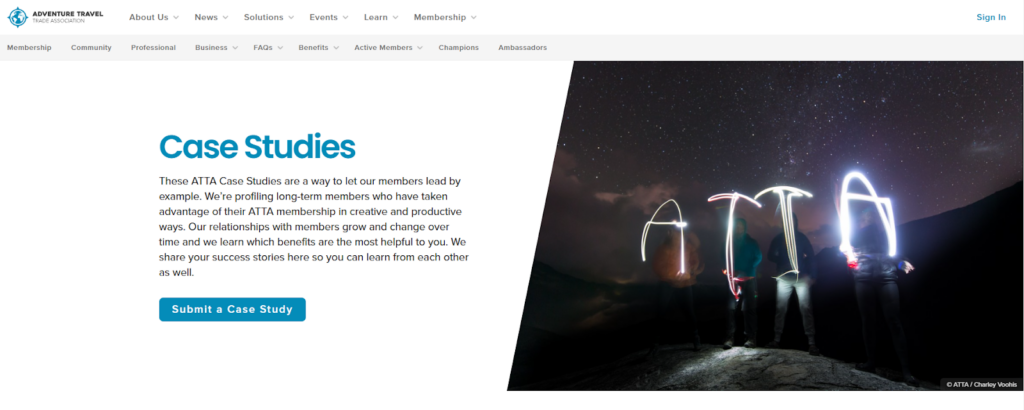
It's a Wrap
Because of search engine algo updates, directory link-building isn’t as effective as 10-15 years ago. Although good directory backlinks are still useful for new businesses and can bring high-intent leads to your website, they don’t have much impact on SEO performance.
That’s why it shouldn’t be your only or main link-building strategy. To achieve a strong, balanced link profile, diversify your SEO strategy with tactics like link insertions, PR campaigns, or guest posts.
Do you need help creating a comprehensive strategy tailored to your unique needs? Get in touch with the Editorial.Link team!













